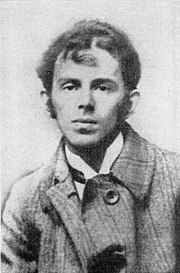Osip Mandelstam
| Osip Mandelstam | |
|---|---|

Osip Mandelstam in 1914
|
|
| Born | Osip Emilyevich Mandelstam 15 January [O.S. 3 January] 1891 Warsaw, Congress Poland, Russian Empire |
| Died | 27 December 1938 (aged 47) Transit Camp "Vtoraya Rechka" (near Vladivostok), USSR |
| Occupation | Poet, Essayist |
| Ethnicity | Jewish |
| Literary movement | Acmeist poetry |
Osip Emilyevich Mandelstam (Russian: О́сип Эми́льевич Мандельшта́м; IPA: [ˈosʲɪp ɪˈmʲilʲjɪvʲɪtɕ məndʲɪlʲˈʂtam]; 15 January [O.S. 3 January] 1891 – 27 December 1938) was a Russian poet and essayist who lived in Russia during and after its revolution and the rise of the Soviet Union. He was the husband of Nadezhda Mandelstam and one of the foremost members of the Acmeist school of poets. He was arrested by Joseph Stalin's government during the repression of the 1930s and sent into internal exile with his wife Nadezhda. Given a reprieve of sorts, they moved to Voronezh in southwestern Russia. In 1938 Mandelstam was arrested again and sentenced to a camp in Siberia. He died that year at a transit camp.
Mandelstam was born in Warsaw (then part of the Russian Empire) to a wealthy Polish Jewish family. His father, a leather merchant by trade, was able to receive a dispensation freeing the family from the pale of settlement and, soon after Osip's birth, they moved to Saint Petersburg. In 1900, Mandelstam entered the prestigious Tenishevsky School. The writer Vladimir Nabokov and other significant figures of Russian and Soviet culture have been among its alumni. His first poems were printed in 1907 in the school's almanac.
In April 1908, Mandelstam decided to enter the Sorbonne in Paris to study literature and philosophy, but he left the following year to attend the University of Heidelberg in Germany. In 1911, he decided to continue his education at the University of Saint Petersburg, from which Jews were excluded. He converted to Methodism and entered the university the same year. He did not complete a formal degree.
...
Wikipedia
